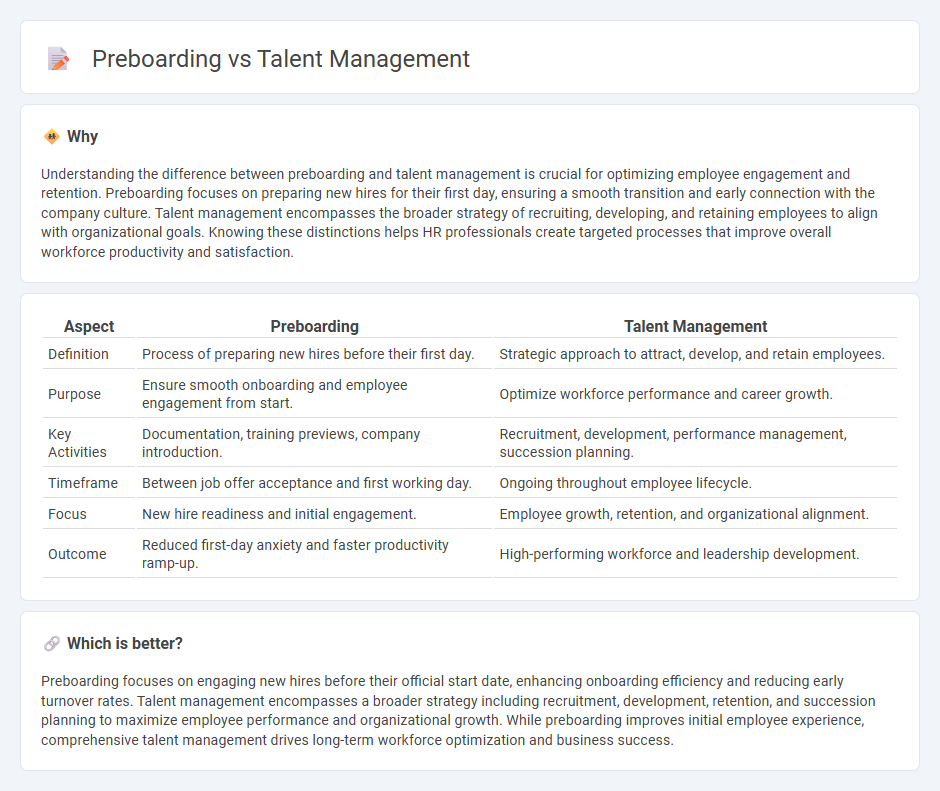
Preboarding focuses on engaging new hires before their official start date to ensure a smooth onboarding experience, improving retention and productivity from day one. Talent management encompasses a broader strategy, including recruitment, development, performance management, and succession planning to maximize employee potential and organizational growth. Discover how integrating preboarding with talent management can elevate your HR effectiveness by exploring key practices and tools.
Why it is important
Understanding the difference between preboarding and talent management is crucial for optimizing employee engagement and retention. Preboarding focuses on preparing new hires for their first day, ensuring a smooth transition and early connection with the company culture. Talent management encompasses the broader strategy of recruiting, developing, and retaining employees to align with organizational goals. Knowing these distinctions helps HR professionals create targeted processes that improve overall workforce productivity and satisfaction.
Comparison Table
| Aspect | Preboarding | Talent Management |
|---|---|---|
| Definition | Process of preparing new hires before their first day. | Strategic approach to attract, develop, and retain employees. |
| Purpose | Ensure smooth onboarding and employee engagement from start. | Optimize workforce performance and career growth. |
| Key Activities | Documentation, training previews, company introduction. | Recruitment, development, performance management, succession planning. |
| Timeframe | Between job offer acceptance and first working day. | Ongoing throughout employee lifecycle. |
| Focus | New hire readiness and initial engagement. | Employee growth, retention, and organizational alignment. |
| Outcome | Reduced first-day anxiety and faster productivity ramp-up. | High-performing workforce and leadership development. |
Which is better?
Preboarding focuses on engaging new hires before their official start date, enhancing onboarding efficiency and reducing early turnover rates. Talent management encompasses a broader strategy including recruitment, development, retention, and succession planning to maximize employee performance and organizational growth. While preboarding improves initial employee experience, comprehensive talent management drives long-term workforce optimization and business success.
Connection
Preboarding accelerates talent management by engaging new hires early, enhancing employee retention and productivity. Effective preboarding programs deliver essential company knowledge and align expectations, which supports smoother onboarding and long-term talent development. Integrating preboarding into talent management strategies reduces turnover rates and fosters a more committed workforce.
Key Terms
**Talent Management:**
Talent management encompasses strategic processes such as recruiting, developing, and retaining skilled employees to drive organizational success and achieve long-term business goals. It integrates workforce planning, performance management, and leadership development to maximize employee potential and enhance productivity. Explore how effective talent management transforms company growth and employee engagement.
Succession Planning
Talent management encompasses a comprehensive strategy for identifying, developing, and retaining skilled employees to ensure organizational growth, with succession planning serving as a critical component by preparing future leaders and minimizing leadership gaps. Preboarding focuses on engaging new hires from the moment they accept a job offer, enhancing their readiness and commitment to accelerate integration into the company culture and roles. Explore how integrating succession planning within talent management and preboarding processes strengthens leadership pipelines and organizational resilience.
Performance Appraisal
Talent management encompasses the entire employee lifecycle, including performance appraisal, whereas preboarding specifically prepares new hires before their first day to enhance engagement and productivity. Performance appraisals within talent management provide structured feedback, goal alignment, and development plans that drive continuous improvement. Explore how integrating preboarding with talent management strategies boosts performance outcomes and employee retention.
Source and External Links
What Is Talent Management? A Guide for 2025 - Talent management is an ongoing process of acquiring, deploying, developing, and assessing talent to build and maintain an optimal workforce aligned with business needs and strategy.
Talent Management: The Complete Guide - Talent management integrates HR processes to attract, develop, motivate, and retain high-performing employees, aiming to improve organizational performance through holistic people management.
Talent Management - OPM - Talent management ensures organizations place the right people with the right skills at the right time by planning workforce needs and closing skills gaps to support mission success and sustained performance.
 dowidth.com
dowidth.com